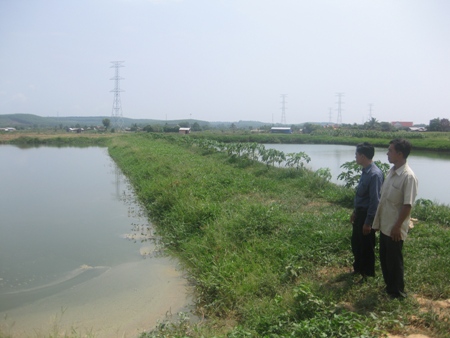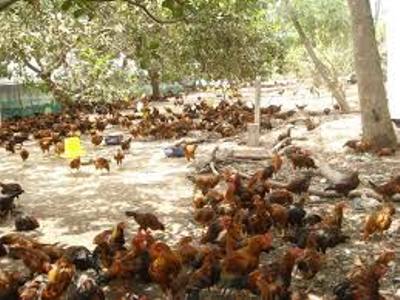
A fishery farming model of farmers in Dong Nai
province
According to the figures released by Dong Nai
Statistics Office, in late 2020 the total herds of cattle in the province
reached 2.18 million heads, down by 14% including more than 2 million pigs,
declining by 14.75% compared to the same period. Currently, most of the pigs
raised in the province are such breeds as Yokshire, Landrace, Duroc, and
Pietrain. The rate of using breeds with advanced techniques in production
reaches 98%. In addition to pigs, the province’s cattle herds are water
buffaloes, cows, goats and so on which are mainly raised in a small and
scattered scale.
The province’s poultry population is approximately
25.65 million chickens and 2 million ducks and geese. In particular, compared to
other livestock animals, chicken farming has advantages in economic efficiency
due to a short period of rotation and a fast multiplication coefficient.
The total area for aquaculture is about 32,000 ha,
including about 30,000 ha for freshwater farming and about 2,000 ha for brackish
water farming. The total number of cages and rafts is approximately 1,000, which
are mainly in Dong Nai river, Tri An lake bed and the brackish water area in Nhon
Trach district.
In 2019 and the first 3 months of 2020, the
prevention of epidemic has been drastically carried out with various solutions
with such outstanding activities as disseminating propaganda activities in
various forms and means with contents related to dangerous diseases like bird
flu, foot-and-mouth disease, blue-ear pig, African swine fever and so on with
the aim of raising farmers’ awareness so that they can actively monitor and
promptly detect diseases and report it to local authorities. In particular,
through the dissemination of propaganda information farmers can often disinfect
barns and farms; have their livestock animals vaccinated against diseases; say
no to hiding information on epidemics and selling sick poultry and livestock
animals; mustn’t dump dead poultry and animals in wrong places; promote the
vaccination and epidemiological surveillance; and bring the activities of
sanitation and disinfection into order. The province currently has 609 farms
that are certified for free-diseases.

The model of raising free-range chickens
However, according to Agriculture and Rural
Development’s assessment epidemics in the livestock sector have still developed
complicatedly, especially African swine fever, which has caused great losses. In
addition, Dong Nai has already had its major roads running through the province.
Therefore, there exists high risk of spreading diseases, some small farms have
not yet paid sufficient attention to building disease-free facilities and
monitoring the risk of infection, the environment for fishery farming and
livestock activities have been heavily affected by climate change, and so on.
The contents of the province’s 2020 epidemic
prevention and control plan will focus on the basic tasks of epidemic prevention
and control. Particularly, for epidemic prevention it is necessary to detoxify,
disinfect and clean up the environment; implement the project of “Piloting the
building of the province’s disease-free zones for chickens towards meeting
export requirements in the period of 2018-2020”; assist to build 40 farms free
of foot-and-mouth diseases and African swine fever; apply compulsory vaccination
to cattle and poultry twice a year.
It is essential to update the prevention and control
of epidemics towards the motto of “Prevention is the key and grassroots units
and people are the key”; promote the dissemination of propaganda information,
proactively and drastically carry out anti-epidemic solutions at the beginning
of the time showing epidemic signs; have pigs culled as required; especially,
re-raise herds of livestock animals with various solutions such as helping with
the construction of disease-free facilities and coordinating with large
livestock businesses to re-raise livestock animals after the epidemic. It is
expected that about 300,000 pigs in the province will be raised in late 2020.
The province’s total funding for disease prevention
and control in the livestock industry by 2020 is approximately VND64 billion.
Duy Minh (Thanh Ngoc)